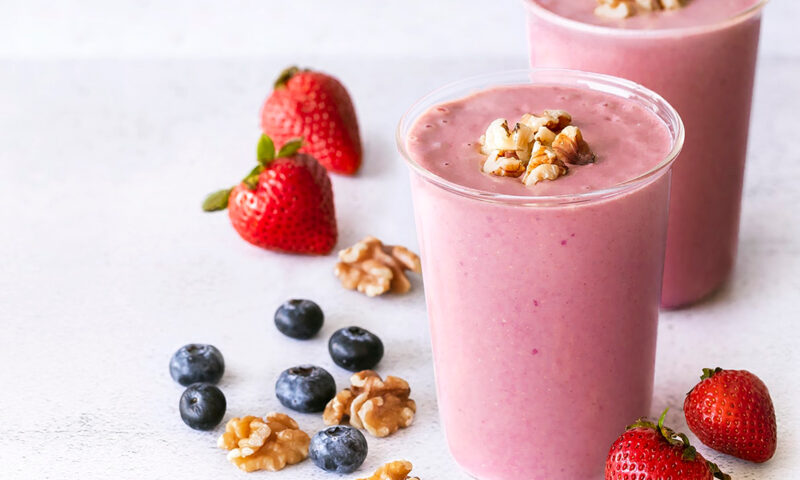Aging is a top concern among those under 30.1 And not without reason.
It is estimated that one in ten Americans aged 45+ deal with subjective cognitive decline. By 2030, the number of people 65 and older with Alzheimer’s disease may grow to a projected 12.7 million.2
From beauty to food, the benefits supporting longevity and long-term health are a driver of purchase decisions among Gen Z or those born between 1997 and 2012.1,3 These younger consumers are focusing on meditation and mindfulness and embracing products with holistic benefits. When it comes to food specifically, survey research suggests that Gen Z and millennials prioritize foods that support their mental health level, among other factors.4
These trends, coupled with a predicted rise in the rates of Alzheimer’s Disease and early onset dementia, suggest there is a desire to focus on lifestyle factors, including food choices, that may support anti-aging efforts, including cognitive decline.5 Taking steps to maintain cognitive performance, by eating a healthy diet and staying active, may help to support brain health.6
As a recommended food within healthy dietary approaches, research on walnuts supports their role in cognitive health and anti-aging.
A Simple Lifestyle Habit that May Help to Boost Your Brain Power
In a first of its kind study, researchers at the University of Reading investigated the impact of eating walnuts for breakfast on brain function throughout the day. They found that eating a generous handful of walnuts (50 g/1.5 oz), mixed into muesli and yogurt, resulted in faster reaction times throughout the day and better memory performance later in the day when compared to eating a calorie-matched breakfast without nuts.7
The research, published in Food & Function, involved 32 healthy young adults aged 18-30 who had a BMI less than 30, did not smoke or follow any restrictive diets, who consumed both the walnut-rich breakfast and the matched breakfast on separate occasions.* Participants completed various cognitive tests while their brain activity was monitored in the six hours after eating each breakfast.
The researchers suggest that walnuts’ mix of nutrients – including omega-3 alpha-linolenic acid (ALA), protein, and plant compounds, may enhance cognitive performance. Walnuts are the only nut to provide an excellent source of omega-3 ALA (2.5g/oz), which has been researched to support brain health, heart health and more.8 Walnuts also provide 4 grams of plant-based protein along with a variety of other nutrients in just one handful.9
Professor Claire Williams, who led the research from the University of Reading, said: “This study helps strengthen the case for walnuts as a brain food. A hearty handful of walnuts with breakfast could give young adults a mental edge when they need to perform at the top of their game. It’s particularly exciting that such a simple dietary addition could make a measurable difference to cognitive performance.”
This is the first study to examine the immediate effects of walnuts on brain function in young adults throughout a single day and the results offer promise for the role of walnuts in improving cognitive performance in young adults. Overall, more research is needed to determine how walnut containing diets may regulate cognitive improvements after eating and in the long-term.
Simple Breakfast Ideas to Add Walnuts
Adding a handful of walnuts to your breakfast is easy. Try out these ideas:
- Top a bowl of cereal or Greek yogurt with chopped walnuts
- Blend a handful of walnuts into your favorite smoothie for a nutty boost
- From pancakes to muffins, add walnuts to the batter for a crunch
Read more about the research supporting walnut consumption and cognitive health and find more recipes ideas on walnuts.org.
References:
*This research was funded by the California Walnut Commission. The funder made no contribution during the design or implementation of the study, nor in the interpretation of findings or the decision to publish.
1 Engler A. This will forever change how we talk about aging in the beauty industry. MindBodyGreen.com. Published December 3, 2024. Accessed April 18, 2025. https://www.mindbodygreen.com/articles/is-this-anti-aging-industry-of-future
2 Centers for Disease Control and Prevention. Subjective Cognitive Decline. CDC.gov. Updated July 2022. Accessed April 22, 2024. https://www.cdc.gov/aging/data/infographic/2019-2020/pdfs/aggregate-scd.pdf.
3 Holtermann C. Why does Gen Z believe it’s ‘aging like milk’? Nytimes.com. Published January 23, 2024. Accessed April 18, 2025. https://www.nytimes.com/2024/01/23/style/gen-z-aging.html
4 Shoup ME. Mintel: What will we be eating and drinking in 2023 and beyond? Foodnavigator-usa.com. Updated November 23, 2022. Accessed April 22, 2024. https://www.foodnavigator-usa.com/Article/2022/11/23/Mintel-What-will-we-be-eating-and-drinking-in-2023-and-beyond
5 Manwell LA, Tadros M, Ciccarelli TM, Eikelboom R. Digital dementia in the internet generation: excessive screen time during brain development will increase the risk of Alzheimer’s disease and related dementias in adulthood. J. Integr. Neurosci. 2022, 21(1), 28.
6 Can alzheimer’s disease by prevented? Alz.org. Accessed April 18, 2025. https://www.alz.org/alzheimers-dementia/research-and-progress/prevention#what%20you
7 Bell L, Dodd GF, Jeavons M, Fisher DR, Whyte AR, Shukitt-Hale B, Williams CM. The impact of a walnut-rich breakfast on cognitive performance and brain activity throughout the day in healthy young adults: a crossover intervention trial. Food Funct. 2025 Feb 10. doi: 10.1039/d4fo04832f. Epub ahead of print. PMID: 39924976.
8 Sala-Vila A, Fleming J, Kris-Etherton P, Ros E. Impact of alpha-linolenic acid, the vegetable omega-3 fatty acid, on cardiovascular disease and cognition [published ahead of print February 16, 2022]. Advances in Nutrition. doi.org/10.1093/advances/nmac016.
9 U.S. Department of Agriculture, Agricultural Research Service. FoodData Central, 2019. fdc.nal.usda.gov.



